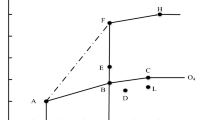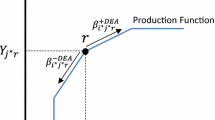Abstract
Typically, the meta-frontier network data envelopment analysis model can be used to evaluate the technological gaps in individual stages simultaneously. However, the technological gap in each stage could also have a biased effect, i.e. one which improves the productivity of a subset of input or output factors. Since decision-making units may face different operational technologies, and have two-stage network structures, this study develops a new approach to investigate the favored direction of technology shift. The novelty of this approach is to identify that the technological gaps could affect the overall production function, both with the input technological bias in the first stage and with the output technological bias in the second stage. By comparing the difference between meta-technology and group technology, the favored direction of technology shift for individual decision-making units can be judged. The proposed approach is illustrated using data from 109 Taiwanese tourist hotels in 2015.




Similar content being viewed by others
References
An, Q., Chen, H., Xiong, B., Wu, J., & Lianglx, L. (2017). Target intermediate products setting in a two-stage system with fairness concern. Omega Int J Manage Sci,73, 49–59.
Assaf, A. G., & Barros, C. (2011). Performance analysis of the Gulf hotel industry: a Malmquist index with bias correction. Int J Hosp Manag,30, 819–826.
Assaf, A., Barros, C. P., & Josiassen, A. (2012). Hotel efficiency: a bootstrapped metafrontier approach. Int J Hosp Manag,31, 621–629.
Barros, C. P., Managi, S., & Yoshida, Y. (2010). Productivity growth and biased technological change in Japanese airports. Transp Policy,17(4), 259–265.
Barros, C. P., & Weber, W. L. (2009). Productivity growth and biased technological change in UK airports. Transp Res E Log,45(3), 642–653.
Chang, Y. C., & Yu, M. M. (2014). Measuring physical productivity growth and biased technological change in Chinese airports. Int J Transp Econ XLI,1, 51–74.
Chen, Y., Cook, W. D., Li, N., & Zhu, J. (2009). Additive efficiency decomposition in two-stage DEA. Eur J Oper Res,196, 1170–1176.
Chen, M. H., Kim, W. G., & Kim, H. J. (2005). The impact of macroeconomic and non-macroeconomic forces on hotel stock returns. Int J Hosp Manag,24(2), 243–258.
Chen, P. C., & Yu, M. M. (2014). Total factor productivity growth and directions of technical change bias: evidence from 99 OECD and non-OECD countries. Ann Oper Res,214, 143–165.
Chiu, C. R., Chiu, Y. H., Chen, Y. C., & Fang, C. L. (2016). Exploring the source of metafrontier inefficiency for various bank types in the two-stage network system with undesirable output. Pac Basin Financ J,36, 1–13.
Chiu, C. R., Lu, K. H., Tsang, S. S., & Chen, Y. F. (2013). Decomposition of meta-frontier inefficiency in the two-stage network directional distance function with quasi-fixed inputs. Int Trans Oper Res,20, 595–611.
Cho, T. Y., & Wang, T. Y. (2018). Estimations of cost metafrontier Malmquist productivity index: using international tourism hotels in Taiwan as an example. Empir Econ,55, 1661–1694.
Du, J., Liang, L., Chen, Y., Cook, W. D., & Zhu, J. (2011). A bargaining game model for measuring performance of two-stage network structures. Eur J Oper Res,210, 390–397.
Duygun, M., Sena, V., & Shaban, M. (2016). Trademarking activities and total factor productivity: some evidence for British commercial banks using a metafrontier approach. J Bank Financ,72, S70–S80.
Emrouznejad, A., & Yang, G. L. (2018). A survey and analysis of the first 40 years of scholarly literature in DEA: 1978–2016. Socio Econ Plan Sci,61, 4–8.
Fei, R., & Lin, B. (2016). Energy efficiency and production technology heterogeneity in China’s agricultural sector: a meta-frontier approach. Technol Forecast Soc,109, 25–34.
Fu, T. T., Juo, J. C., Chiang, H. C., Yu, M. M., & Huang, M. Y. (2016). Risk-based decompositions of the meta profit efficiency of Taiwanese and Chinese banks. Omega Int J Manage Sci,62, 34–46.
Giménez, V., Keith, J. R., & Prior, D. (2019). Do healthcare financing systems influence hospital efficiency? A metafrontier approach for the case of Mexico. Health Care Manag Sci. https://doi.org/10.1007/s10729-019-9467-9.
Hayami, Y. (1969). Sources of agricultural productivity gap among selected countries. Am J Agric Econ,51, 564–575.
Hayami, Y., & Ruttan, V. W. (1970). Agricultural productivity differences among countries. Am Econ Rev,60, 895–911.
Hsieh, L. F., & Lin, L. H. (2010). A performance evaluation model for international tourist hotels in Taiwan: an application of the relational network DEA. Int J Hosp Manag,29, 14–24.
Huang, C. W., Ting, C. T., Lin, C. H., & Lin, C. T. (2013). Measuring non-convex metafrontier efficiency in international tourist hotels. J Oper Res Soc,64, 250–259.
Kao, C. (2018a). Multiplicative aggregation of division efficiencies in network data envelopment analysis. Eur J Oper Res,270(1), 328–336.
Kao, C. (2018b). A classification of slacks-based efficiency measures in network data envelopment analysis with an analysis of the properties possessed. Eur J Oper Res,270, 1109–1121.
Kao, C., & Hwang, S. N. (2008). Efficiency decomposition in two-stage data envelopment analysis: an application to non-life insurance companies in Taiwan. Eur J Oper Res,185, 418–429.
Kao, C., & Hwang, S. N. (2011). Decomposition of technical and scale efficiencies in two-stage production systems. Eur J Oper Res,211, 515–519.
Kao, C., & Liu, S. T. (2019). Cross efficiency measurement and decomposition in two basic network systems. Omega Int J Manage Sci,83, 70–79.
Kerstens, K., O’Donnell, C., & Van de Woestyne, I. (2019). Metatechnology frontier and convexity: a restatement. Eur J Oper Res,275, 780–792.
Lee, S. G., & Midani, A. (2015). Comparison of efficiency levels using meta-frontier analysis of global fisheries for the period 1960–2010. Fish Sci,81(2), 247–254.
Li, T., Baležentis, T., Cao, L., Zhu, J., Štreimikienė, D., & Melnikienė, R. (2018). Technical change directions of China’s grain production: application of the bias-corrected Malmquist indices. Technol Econ Dev Econ,24(5), 2065–2082.
Li, Y., Chen, Y., Liang, L., & Xie, J. H. (2012). DEA models for extended two-stage network structures. Omega Int J Manage Sci,40, 611–618.
Li, Y., Wang, Y. Z., & Cui, Q. (2015). Evaluating airline efficiency: an application of virtual frontier network SBM. Transp Res E Log,81, 1–17.
Liang, L., Cook, W. D., & Zhu, J. (2008). DEA models for two-stage processes: Game approach and efficiency decomposition. Nav Res Log,55, 643–653.
Lin, B., & Zhao, H. (2016). Technology gap and regional energy efficiency in China’s textile industry: a non-parametric meta-frontier approach. J Clean Prod,137, 21–28.
Liu, J. S., & Lu, W. M. (2012). Network-based method for ranking of efficient units in two-stage DEA models. J Oper Res Soc,63, 1153–1164.
Lozano, S. (2017). Technical and environmental efficiency of a two-stage production and abatement system. Ann Oper Res,255, 199–219.
Molinos-Senante, M., Maziotis, A., & Sala-Garrido, R. (2017). Assessing the productivity change of water companies in England and Wales: a dynamic metafrontier approach. J Environ Manag,197, 1–9.
Nguyen, H. O., Nghiem, H. S., & Chang, Y. T. (2018). A regional perspective of port performance using metafrontier analysis: the case study of Vietnamese ports. Marit Econ Logist,20(1), 112–130.
O’Donnell, C. J., Rao, D. S. P., & Battese, G. E. (2008). Metafrontier frameworks for the study of firm-level efficiencies and technology ratios. Empir Econ,34, 231–255.
Thieme, C., Prior, D., & Tortosa-Ausina, E. (2013). A multilevel decomposition of school performance using robust nonparametric frontier techniques. Econ Educ Rev,32, 104–121.
Tone, K., & Tsutsui, M. (2009). Network DEA: a slacks-based measure approach. Eur J Oper Res,197, 243–252.
Wu, J., Zhu, Q., Ji, X., Chu, J., & Liang, L. (2016). Two-stage network processes with shared resources and resources recovered from undesirable outputs. Eur J Oper Res,251(1), 182–197.
Yu, M. M. (2008). Assessing the technical efficiency, service effectiveness, and technical effectiveness of the world’s railways through NDEA analysis. Transp Res A Policy,42(10), 1283–1294.
Yu, M. M., & Chen, L. H. (2016). Productivity growth of Taiwanese international tourist hotels in a metafrontier framework. Cornell Hosp Q,57(1), 38–50.
Yu, M. M., & Lee, C. Y. (2009). Efficiency and effectiveness of service business: evidence from international tourist hotels in Taiwan. Tour Manage,30, 571–580.
Zhou, Z., Sun, L., & Yang, W. (2013). A bargaining game model for efficiency decomposition in the centralized model of two-stage systems. Comput Ind Eng,64, 103–108.
Zhu, W., Zhang, Q., & Wang, H. (2017). Fixed costs and shared resources allocation in two-stage network DEA. Ann Oper Res. https://doi.org/10.1007/s10479-017-2599-8.
Acknowledgements
This work was supported by the Ministry of Science and Technology of the Republic of China (Project No. MOST 104-2410-H-019-013-MY3).
Author information
Authors and Affiliations
Corresponding author
Additional information
Publisher's Note
Springer Nature remains neutral with regard to jurisdictional claims in published maps and institutional affiliations.
Rights and permissions
About this article
Cite this article
Yu, MM., Chen, LH. A meta-frontier network data envelopment analysis approach for the measurement of technological bias with network production structure. Ann Oper Res 287, 495–514 (2020). https://doi.org/10.1007/s10479-019-03436-3
Published:
Issue Date:
DOI: https://doi.org/10.1007/s10479-019-03436-3




